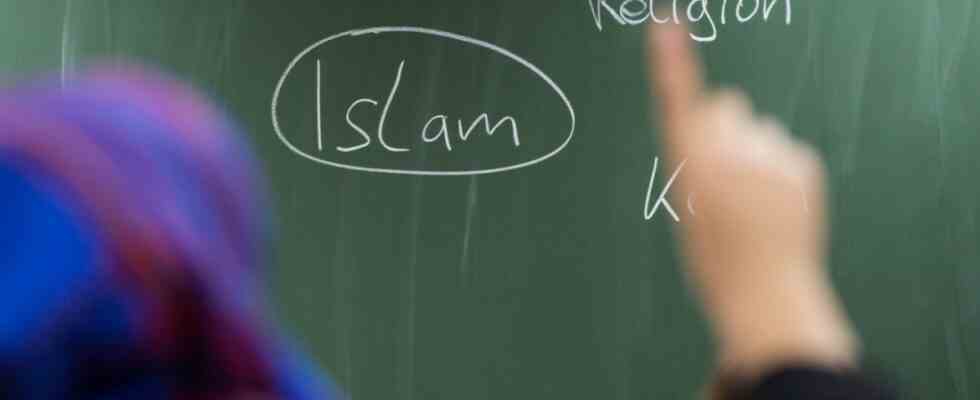The first year of normality in Islamic classes in Bavaria’s schools is coming to an end this week. This raises the question of whether the jolt that many longed for occurred in regular operation. And with it the solution of various problems.
For twelve years, the teaching of Islam in the Free State was temporary, although the success of this school experiment was undisputed among scientists, teachers, parents and many politicians. The model project was extended again and again, but never made permanent. The frustration in the schools grew because the uncertainty brought problems: there were no textbooks and curricula, the number of schools was limited, and most of the teachers were only employed on a temporary basis. This led to poaching by other federal states and little interest in the subject among student teachers. The entire offer depends on the number of teachers. And the need is there: there are around 160,000 Muslim schoolchildren in Bavaria.
Minister of Education Michael Piazolo (free voters) had announced a “needs-based” expansion with the regular operation of the new compulsory elective subject. The problem is that it doesn’t matter how great the need is if there aren’t any teachers. After all, most Islam teachers are now employed on a permanent basis. And the Bavarian Constitutional Court has just dismissed a lawsuit against the subject.
A real jolt cannot be determined, but the numbers are positive: In this school year, 369 schools offered Islam lessons to a total of 17,673 Muslim boys and girls, which is two schools and around 700 students more than in the pilot project. Ascending trend. After the summer holidays, nine junior high schools and high schools are to be added to the seven established ones. The Ministry of Education does not yet know the numbers for the elementary and secondary schools, which offer the majority of Islamic instruction. 115 teachers taught this year, ten more than before. After all. Another 15 are scheduled to start in elementary and middle schools in the fall.
These are not big leaps, but positive signals can be heard from the Friedrich-Alexander-Universität Erlangen-Nürnberg (FAU): According to Tarek Badawia, Professor of Islamic Religious Education, interest in the subject has increased significantly. The Ministry of Culture speaks of 41 enrolled students and two who took their state exams in 2021. In order to create mass, the ministry relies on further training at the teacher academy in Dillingen. Compared to the FAU, these are of course more of a crash course, but they say there is a lot of interest there too. Piazolo’s house is asking for understanding that teacher training takes time.
Tanja Kölbel didn’t want to wait any longer, she created facts before the state government did. At her elementary school in Neumarkt in der Oberpfalz, all young Muslims have been able to attend Islam classes for two years. That was unthinkable for a long time. Kölbl lacked teacher lessons, children had to take a break in between and choose ethics or years learned together. Then Kölbel distributed the hours so that everyone benefited. More is not possible, her Islam teacher Mehmet Yalçin teaches at seven primary and secondary schools in the Upper Palatinate. Yalçin says that the new regular operation has not changed that. “Unfortunately.” Some of his schools wanted more teaching hours, to no avail. Still, Yalçin sounds positive. After 20 years as a teacher in the Free State, he got a permanent contract. And in many schools, Islam lessons now run parallel to religion, he says, sounding satisfied. For Yalçin, that feels like appreciation, like recognition.
Pupils also describe this feeling of appreciation when they talk about Islam lessons. A special offer for them, a symbol of belonging. And if you feel like you belong in the school, you don’t look for it anywhere else. Teaching Islam in state schools with a state curriculum is considered a good way to prevent extremism. The vast majority of students simply benefit from discussing their religion at the neutral school location. A visit to the Pirckheimer Gymnasium in Nuremberg showed just how eagerly young men and women talked to their teachers about the sense and nonsense of some customs, analyzed passages from the Koran and questioned traditions. The enthusiasm of the students was overwhelming. Today, headmaster Benedikt Mehl says: “I’m afraid we’ve won each other to death.”
Because they are so experienced, Mehl had to borrow his teachers. It’s unclear whether he’ll get her back. One is now training Islam teachers in Dillingen, the other is working on a project for the ministry and is only half at school. An external teacher stepped in, but he also works at four other schools in Nuremberg. More is not possible. “We can just about provide for the lessons,” says Mehl. There is hardly any time left for the nice things about school, breaking a fast together after Ramadan or preparing for the interreligious celebration at the beginning of the school year.

